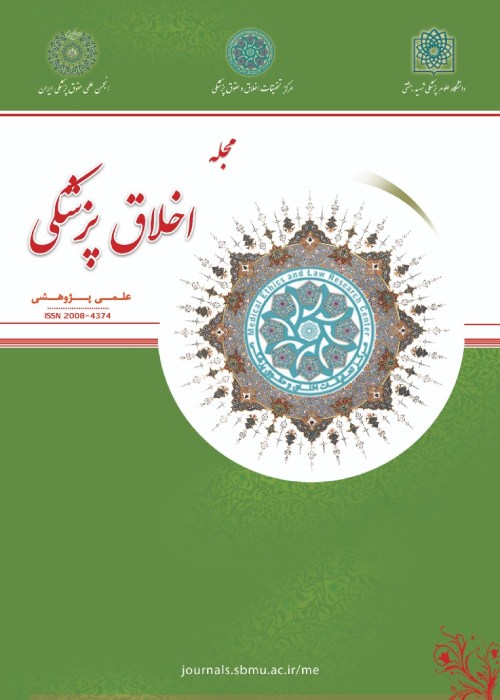Assessment of Human Dignity in Women with Breast Cancer Undergoing Chemotherapy
Author(s):
Abstract:
Background And Aim
Despite the remarkable advances in medical science, cancer continues to be one of the most important challenges in the field of health, the cause of eight million deaths between 1990 and 2010 in the world and the third leading cause of death after heart diseases and accidents in Iran. According to the World Health Organization, the number of patients and deaths will reach from 11.3 and 7.9 million in 2007 to 15.5 and 11.5 million cases in 2030, respectively. Breast cancer is the most common cancer among Iranian women. Iranian women catches the breast cancer at least a decade earlier than their counterparts in developed countries that shows the importance of this disease. Studies show that people with life-threatening diseases such as cancer are suffering from with a range of problems, including mental, social and existential challenges, which endangers their sense of dignity. The fundamental nature of caring is to protect the dignity of patients and this issue has not been studied in women with breast cancer undergoing chemotherapy in Iran, so this study aimed to assess the different aspects of dignity from the perspective of women with breast cancer who underwent chemotherapy in hospitals affiliated to Shahid Beheshti University of Medical Sciences, Tehran, Iran, 2015.Materials And Methods
In this cross sectional study, the study population consisted of all women with breast cancer undergoing chemotherapy in hospitals affiliated to Shahid Beheshti University of Medical Sciences. Purposive sampling method was used to select hospitals; 207 patients selected using convenient sampling method. The research instrument included Patient Dignity Inventory (PDI) designed in 2008 and includes 5 dimensions, including experiencing symptoms of tension, existential tension, peace of mind, dependency and social support. The validity of the instrument was confirmed using confirmatory factor analysis. The instrument enjoyed good fit in all aspects (0.47). Its reliability was confirmed with Cronbach's alpha coefficient of 0.76. Data collect was carried out using the translation of human dignity inventory designed by Chochinov. This inventory contains 25 statements covering 5 dimensions, including experiencing symptoms of tension, existential tension, peace of mind, dependency and social support. Each question is assigned a score of 1-5. A lower score means that the patient is less benefited from the dignity. Also, the demographic questionnaire which included age, marital status, occupation, educational level, level of satisfaction with the family income, duration of diagnosis and presence or lack of mastectomy surgery, was used. Data analysis was analyzed using descriptive statistics and T-test, ANOVA and DUNCAN.Ethical Considerations: This study is the product of master's thesis with number of.... . Data collection was carried out after explaining the purpose of the study, emphasizing confidentiality and obtaining the oral informed consent from participants.
Findings: The response rate was 100% in the studied group whose demographics were as follows: married women (68.1%), high school diploma or less (64.7%), housewives (84.5%) and low satisfaction of their monthly income (67.6%). In 56.5% of patients, the disease was diagnosed less than 1 year ago. Dignity overall score of 1.94 out of 5 was obtained. The dignity score of patients in dimension of experiencing tension symptoms was (mean of 2.40 ± 0.96). Existential tension, peace of mind, dependency and social support were assigned highest scores respectively with mean of (1.87± 0.5), (1.87±0. 77), (1.71±0.77) and (1.31±0.55). Existential tension score was higher in educated women, though there was no statistically significant difference between the different levels of education and dignity score. Also, peace of mind and social support in different educational levels differed significantly (P=0.004). There was no significant difference in overall dignity score of patients in the different occupational levels. Despite the lack of a significant relationship between overall dignity score of patients and their degree of satisfaction with their income, it was observed that patients who were satisfied with their income, reported less tension in three dimensions of experiencing symptoms of tension (P=0.005), existential tension (P=0.029) and social support (P=0.004). There was a significant relationship only between the existential tension dimension of dignity and the hospital's type (P=0.004). There was a significant relationship between patient's dignity score and degree of social support and patients showed the least concern in the social support dimension.
Discussion and
Conclusion
Given that most patients were concerned about the experiencing symptoms of tension dimension and then the existential tension, peace of mind, dependency and social support dimensions, identifying different sources of tension experienced by patients with breast cancer undergoing chemotherapy, contributed greatly to group therapy and care, especially nurses to make right decisions. It also seems necessary that health care team, especially nurses take measures to meet dignity-related needs of this group of patients, especially in the dimension of experiencing symptoms of tension.Keywords:
Language:
Persian
Published:
Journal of Medical Ethics, Volume:11 Issue: 39, 2017
Pages:
7 to 17
magiran.com/p1694027
دانلود و مطالعه متن این مقاله با یکی از روشهای زیر امکان پذیر است:
اشتراک شخصی
با عضویت و پرداخت آنلاین حق اشتراک یکساله به مبلغ 1,390,000ريال میتوانید 70 عنوان مطلب دانلود کنید!
اشتراک سازمانی
به کتابخانه دانشگاه یا محل کار خود پیشنهاد کنید تا اشتراک سازمانی این پایگاه را برای دسترسی نامحدود همه کاربران به متن مطالب تهیه نمایند!
توجه!
- حق عضویت دریافتی صرف حمایت از نشریات عضو و نگهداری، تکمیل و توسعه مگیران میشود.
- پرداخت حق اشتراک و دانلود مقالات اجازه بازنشر آن در سایر رسانههای چاپی و دیجیتال را به کاربر نمیدهد.
In order to view content subscription is required
Personal subscription
Subscribe magiran.com for 70 € euros via PayPal and download 70 articles during a year.
Organization subscription
Please contact us to subscribe your university or library for unlimited access!



